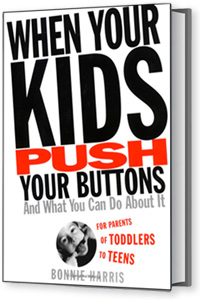Tis the season for generosity of spirit and deed — and for highlighting the lack of it in our children.
I bet not one of you hopes your children will become more self-absorbed, stingy, ungrateful, and inconsiderate. You do everything in your power to prevent this. So how does it happen that so many children grow to be entitled, self-centered, and insensitive? The problem lies in how you use the “everything in your power” to raise generous, appreciative kids. When parents focus more on their child’s lack of anything, ironically that is what grows.

Aren’t we all self-absorbed, really? We all want what we want when we want it. The difference between us and children is that we have (hopefully) gone through the maturing process. In so doing, we learn that other people want what they want too. We learn that if we’re going to be in relationship, we need to be considerate of the other’s agenda and make compromises, so a relationship can work.
But your kids aren’t there yet. They should not be expected to consider what they are not ready for.
Traditional parenting tells parents if they don’t teach gratitude, sharing, and consideration immediately, children will never learn and will grow into entitled spoiled brats. So, when that normal developmentally appropriate territorialism hits with “Mine”, grabbing toys, ignoring requests, shoving and hitting, parents freak out and depend on controlling fear tactics to teach right from wrong, altruism and kindness.
Yes, life would be easier if your children did what you wanted when you wanted it, if they didn’t embarrass you in public, if their behavior made you proud. But can you see — that’s all about you.

We really are self-centered when it comes to raising our children. When they behave like children, we get our buttons pushed, fear for their (and our) futures, and react. Our reactions cause feelings of powerlessness, scarcity, fear of getting in trouble in our children and behavior gets worse. Soon we have the kids we have been trying not to have and wonder what happened.
We can’t expect our children to turn out differently from what they experience at home. So, let’s start there:
- Are you as respectful of your children as you want them to be of you? Or do you yell, blame, threaten, take away their favorite things all in the name of good discipline?
- Do you set double-standards? Do you restrict their technology time but not your own? Do you tell them to stop yelling, using foul language, or ignoring you, yet you yell, use foul language, and ignore them?
- Do you threaten and provoke their anger or fear to make them do what you want and then blame them when they “won’t listen”?
- Do you get angry at them when they get angry yet expect them to have consideration for you when you’re upset?
Why do we think we can speak to our children differently from how we want them to speak to us?
Being respectful does not mean giving them what they want. It means taking the lead on empathy, kindness, compromise, and problem solving, which never requires blame, threats, and punishment.
When kids are always told what to do and how, they feel like pawns pushed around on a chess board. The result is a teenager who no longer listens to parents, who takes cues from peers, and flounders in the face of responsibility — exactly the opposite of who we set out to raise.

When children don’t feel understood and accepted but criticized and judged, they stop counting on parents for support. Perhaps they get told what to do instead of being listened to. They soon turn off to you and find their own way.
Pay attention to what is important in the everyday trenches of parenting to one day raise a child with a generous spirit. Can you:
- Allow your young child’s natural ego-centrism. Don’t expect preschoolers to “be the big boy”, “know better”, “be kind to the baby”, share their toys. When ego-centrism is accepted and understood, children grow out of it naturally. When punitive tactics attempt better behavior, children grab for what they fear is being taken away. That’s how narcissism grows.
- Learn about developmental stages and inborn temperament so your expectations of behavior are realistic for your child.
- Don’t expect gratitude for the choices you make for your children and what they have learned to expect.
- Be respectful even when setting a limit. “It’s not okay with me that “y” happens. What can we agree on, so it works for both of us?”
- Understand that when children behave badly it’s because they are having a problem, not being a problem. When you address the emotions that provoke the behavior, not just the behavior, you get to the cause and teach compassion.

- Be sure your children chip in to help with household jobs to learn how teams work together to get things done.
- Make sure your children feel like important members of the family by including them in decisions that affect their lives.
- Show your interest and generosity to your kids. Give them second chances. Listen to what they care about.
- Be proactive regarding gifts. Talk about the gestures made and the importance of thank yous and appreciation. Let them know they can gripe to you about the socks or the “baby” toy from Aunt Sarah.
- Stress that generosity is a responsibility for those who have, a sacrifice that can be made for those who don’t have.
Here are a few ideas for bringing generous activity into your home:
- Get in a daily habit of everyone listing 3 things they are grateful for that day at dinner or bedtime. Incorporate 1 thank you to each member of the family.
- Designate times when you and the kids gather unwanted toys and clothes to give to needy children. Don’t push it on young children who may still be attached to even their unused things.
- Host birthday parties suggesting that presents be donations to a charity.
- Give allowance in 3 parts: 1 part for saving, 1 for spending, and 1 for a charity that you and your child choose together. Check out Daymaker.com.
- Whenever you make donations to a food pantry, etc., take your kids along and as often as possible, choose a time when they see people receiving donations as well.
- Choose a family charity organization that you keep track of. For example, follow how many children are benefiting from donated school equipment in Zambia.
- Read something from the paper at dinner reporting on a generous or kind act.
- Encourage kids giving to loved ones for birthdays and holidays. Even young children can draw pictures or make cards.

Be sure your own gratitude and generosity is the most important teacher for your children. Your behavior and attitude teaches far more than your words.
 We punish our children in an attempt to keep them from pushing our buttons, often escalating the original problem into a cycle of anger and blame. When Your Kids Push Your Buttons is not about what to do to your kids to get them to stop pushing your buttons. This book is about how to be the parent you wish you could be-the parent that only you are holding yourself back from.
We punish our children in an attempt to keep them from pushing our buttons, often escalating the original problem into a cycle of anger and blame. When Your Kids Push Your Buttons is not about what to do to your kids to get them to stop pushing your buttons. This book is about how to be the parent you wish you could be-the parent that only you are holding yourself back from.
Related Articles:
https://bonnieharris.com/raising-gratitude/
https://bonnieharris.com/connective-parenting-newsletter/newsletter-archives/lesson-whys-hows-giving-allowance/







